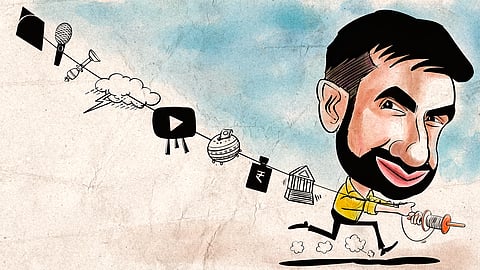WTF Is: Inside Nikhil Kamath’s networks, narratives and new ambitions
“If you want to portray an accurate picture of me to your audience, you shouldn’t care about if I get offended, right? Pick the faults in my life, pick what you do not agree with…”
-Nikhil Kamath, on a podcast in 2021
If you were to ask Nikhil Kamath to tell you his story, he would have the answer down pat. After all, it’s one the 39-year-old and his interviewers have recounted over and over again for the last five years, as a whole and in parts, on podcasts where he was a guest and where he’s the host.
Middle-class upbringing. School dropout. Call centre employee and trader. Then, co-founder of the hugely profitable startup Zerodha. Billionaire. Investor. Philanthropist. And, most recently, the host of “WTF is”, his viral podcast with guests like Open AI CEO Sam Altman and Prime Minister Narendra Modi.
This is therefore the story his viewers, running into lakhs, would be familiar with. “Nikhil Kamath’s podcasts are really famous among a certain kind of young man,” says Nikhil Taneja, co-founder of Yuvaa, a Mumbai-based organisation working in youth media, research and impact. “It’s not that young women don’t listen to him, but young men listen to him in hordes because he is a self-made billionaire.”
In a country where the ranks of the wealthy and famous tend to be dominated by those with generational wealth and familial connections, that would strike a chord. It’s part of his appeal for people like Yash Gawde, a 22-year-old founder from Mumbai, who listens to his podcasts regularly and had recently posted about how he almost met Nikhil in a cafe. “His story feels relatable – he comes from a normal, middle-class family. He’s not someone who was (always) very rich,” says Yash, who is working on an AI startup. For both Yash and his friends, who he describes as “nerds and business owners” like him, Nikhil is their hero. “People are crazy about him.”
Nikhil’s friends, like Biocon founder Kiran Mazumdar-Shaw, refer to him as a youth icon. A well-known business figure herself, she says her appearance on his podcast in turn made her famous among a wider, younger demographic. “People started to come up to me and ask for selfies. Even at the airport, staff told me, ‘Ma’am we saw you on Nikhil Kamath’s podcast’,” says Kiran, who came to know Nikhil closely after he became her neighbour in the uber-exclusive Kingfisher Towers in central Bengaluru.
Despite the difference in their age – Kiran is 72, Nikhil 39 – and outlook to life (“He’s not confined by barriers or boundaries”), she says she considers him a good friend she always has interesting conversations with. Interactions where they learn from each other’s spheres, hers being life sciences and his, tech. “I’m like the older mother, telling him he should be more committed in his relationships, that he should get married and he will ask why,” she jokes. (Nikhil’s 2019 marriage to Amanda Puravankara, the daughter of Bengaluru-based real estate developer Puravankara’s founder, did not last and he has not married again.)
It’s not difficult to see why he may be considered an icon, at least in some quarters. Nikhil’s is a success story twice over: the young, self-made billionaire who co-founded a startup raking in an annual profit of over Rs 5,000 crore with no external funding – an island in a sea of venture capital-funded, loss-making startups; and the podcast host-influencer attracting millions of views in a world where online reach is the ultimate currency.
The “how” of his trajectory is a more layered question. That would speak as much to India’s own arc over the years, the role models we choose today, how we choose them and how they are using the influence they command. Unlike the Nikhil Kamath of a decade ago, very much in the shadow of his elder brother, Nithin, the Nikhil of 2025 is a figure increasingly in the public domain, with a network far wider and more powerful than the most successful of his peers. He’s seen interacting with the prime minister, discussing AI and investments with Silicon Valley’s top honchos, eliciting advice for young, aspiring entrepreneurs in India and sharing his own worldview, even on topics that may lie outside his domain.
How he wields the platform he has built and the story he chooses to tell about how he got there, therefore, deserves attention.
“The only plan was to make money”
Nikhil’s early years would be familiar enough to those who grew up in India at the cusp of globalisation.
His father, Udyavara Raghuram Kamath, was an officer in Canara Bank, a public sector bank set up in Mangalore at the turn of the previous century by Ammembal Subba Rao Pai, a prominent figure in the Goud Saraswat Brahmin community, incidentally the same community the Kamaths belong to. His Brahmin identity is one Nikhil mentions, not as someone conscious of its privilege but in remarks like “I come from a typical, middle-class, Brahmin family” and “We are from a Brahmin family, both parents are Brahmins. Tho (So) all our cousins are like PhDs and MS”.

